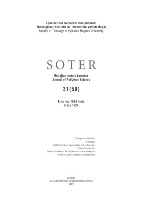Teologinė džiaugsmo estetika Antano Maceinos religijos filosofijoje
THEOLOGICAL AESTHETICS OF JOY IN THE PHILOSOPHY OF RELIGION OF ANTANAS MACEINA
Author(s): Dalia JakaitėSubject(s): Christian Theology and Religion
Published by: Vytauto Didžiojo Universitetas
Keywords: Maceina; džiaugsmas; estetinė sąmonė; poezija; teologija; Heideggeris; Jonas Krikštytojas; šventasis Pranciškus; Mergelė Marija; malda; Maceina; joy; aesthetic consciousness; poetry; theology; Heidegger; St. John the Baptist; St. Francis of Assisi; Virgin
Summary/Abstract: The subject of the article – the refection of joy in the aesthetics and poetics of Antanas Maceina’s philosophy of religion. Joy is connected with suffering and drama through dialectic links of religious consciousness. Literature is existential form of expression, philosophical impulse or foundation, which is theologically motivated and based on religious experience and refection. The method used in the article is a discussion about the relationship between literary and religious experience in the writings of A. Maceina. Philosophical refection of joy and (or) its theological expression are discussed as parts of aesthetic and religious consciousness. The main point of the article is theologically impossible foundation of sadness in A. Maceina’s “Saulės giesmė” (The Song of the Sun) and his autobiographical study “Filosofijos keliu” (On the way of Philosophy), which points out the distinction between philosophy and theology, at the same time pointing out the unity of literature and philosophy. Although he clearly wants to distance himself from the identity of a theologian, according to our notion of theology the philosopher undoubtedly acquires this identity, while realizing in his works revelational and preaching aspect of “the science of faith”. To the philosophical questions belongs the theological comprehensiveness as well, which is protected from “dogmatism” by individualizing the literary consciousness. “The apostolate” of joy, in the way Maceina understands it, can be found in the “Jobo drama” (Te Drama of Job) through the experience and refection on holiness, mortification, play, indifference and other. In the “Laiškai rašytojams” (Letters to the Writers), poetry is conceived as a joyful game. This conception is based on the Gospel and the influence of M. Heidegger. The fact that the poets did not hear the voice of the Gospel as the Good News is considered as an existential obstacle of a creative game (the nature of art). Art and liturgy arise as the forms of transcendent existence, which change dialogically through their experiences and identities. For Maceina, who did research on the essence of modern literature, poetry is a creative prophet of God and salvation, and impossible without joy, which appears in different forms. Next to the biblically (Book of Proverbs, Psalms) founded game, symbolism is another very significant category, explaining theological joy of poetry. A symbol is based on the statements of the Bible and the Church and is the best expression of the essence of God’s created world and human person in the presence of God. If not presented as the fire of the Holy Spirit, poetry is metaphorically represented as the water of Jordan of St. John the Baptist, who is “only” a sign. This figure of the Gospel paradoxically unites M. Heidegger’s experience of art as a game and the theology of joy. The problem of joy acquires a very clear and significant form in the first part of the trilogy (The Song of the Sun), which analyses “a
Journal: SOTER: religijos mokslo žurnalas
- Issue Year: 59/2009
- Issue No: 31
- Page Range: 37-51
- Page Count: 15
- Language: Lithuanian

